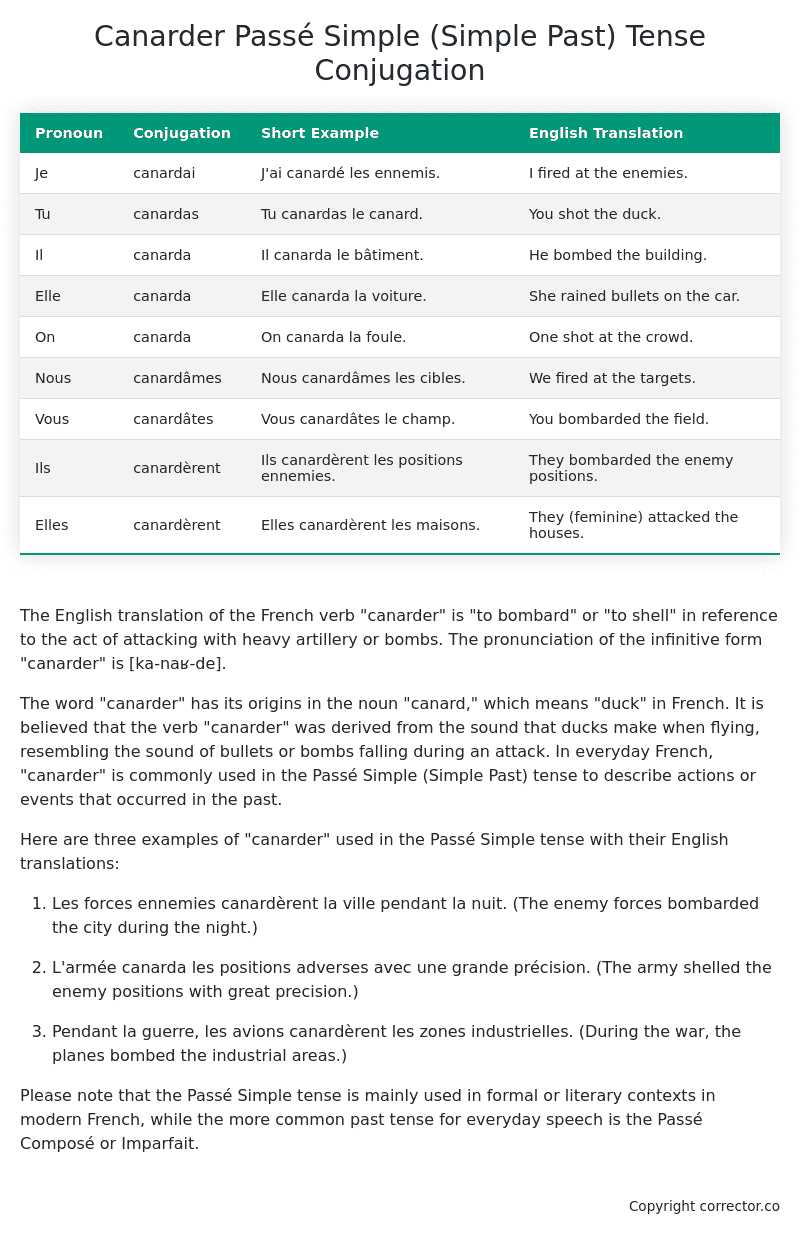Passé Simple (Simple Past) Tense Conjugation of the French Verb canarder
Introduction to the verb canarder
The English translation of the French verb “canarder” is “to bombard” or “to shell” in reference to the act of attacking with heavy artillery or bombs. The pronunciation of the infinitive form “canarder” is [ka-naʁ-de].
The word “canarder” has its origins in the noun “canard,” which means “duck” in French. It is believed that the verb “canarder” was derived from the sound that ducks make when flying, resembling the sound of bullets or bombs falling during an attack. In everyday French, “canarder” is commonly used in the Passé Simple (Simple Past) tense to describe actions or events that occurred in the past.
Here are three examples of “canarder” used in the Passé Simple tense with their English translations:
-
Les forces ennemies canardèrent la ville pendant la nuit.
(The enemy forces bombarded the city during the night.) -
L’armée canarda les positions adverses avec une grande précision.
(The army shelled the enemy positions with great precision.) -
Pendant la guerre, les avions canardèrent les zones industrielles.
(During the war, the planes bombed the industrial areas.)
Please note that the Passé Simple tense is mainly used in formal or literary contexts in modern French, while the more common past tense for everyday speech is the Passé Composé or Imparfait.
Table of the Passé Simple (Simple Past) Tense Conjugation of canarder
| Pronoun | Conjugation | Short Example | English Translation |
|---|---|---|---|
| Je | canardai | J’ai canardé les ennemis. | I fired at the enemies. |
| Tu | canardas | Tu canardas le canard. | You shot the duck. |
| Il | canarda | Il canarda le bâtiment. | He bombed the building. |
| Elle | canarda | Elle canarda la voiture. | She rained bullets on the car. |
| On | canarda | On canarda la foule. | One shot at the crowd. |
| Nous | canardâmes | Nous canardâmes les cibles. | We fired at the targets. |
| Vous | canardâtes | Vous canardâtes le champ. | You bombarded the field. |
| Ils | canardèrent | Ils canardèrent les positions ennemies. | They bombarded the enemy positions. |
| Elles | canardèrent | Elles canardèrent les maisons. | They (feminine) attacked the houses. |
Other Conjugations for Canarder.
Le Present (Present Tense) Conjugation of the French Verb canarder
Imparfait (Imperfect) Tense Conjugation of the French Verb canarder
Passé Simple (Simple Past) Tense Conjugation of the French Verb canarder (You’re reading it right now!)
Passé Composé (Present Perfect) Tense Conjugation of the French Verb canarder
Futur Simple (Simple Future) Tense Conjugation of the French Verb canarder
Futur Proche (Near Future) Tense Conjugation of the French Verb canarder
Plus-que-parfait (Pluperfect) Tense Conjugation of the French Verb canarder
Passé Antérieur (Past Anterior) Tense Conjugation of the French Verb canarder
Futur Antérieur (Future Anterior) Tense Conjugation of the French Verb canarder
Subjonctif Présent (Subjunctive Present) Tense Conjugation of the French Verb canarder
Subjonctif Passé (Subjunctive Past) Tense Conjugation of the French Verb canarder
Subjonctif Imparfait (Subjunctive Imperfect) Tense Conjugation of the French Verb canarder
Subjonctif Plus-que-parfait (Subjunctive Pluperfect) Tense Conjugation of the French Verb canarder
Conditionnel Présent (Conditional Present) Tense Conjugation of the French Verb canarder
Conditionnel Passé (Conditional Past) Tense Conjugation of the French Verb canarder
Conditionnel Passé II (Conditional Past II) Tense Conjugation of the French Verb canarder
L’impératif Présent (Imperative Present) Tense Conjugation of the French Verb canarder
L’impératif Passé (Imperative Past) Tense Conjugation of the French Verb canarder
L’infinitif Présent (Infinitive Present) Tense Conjugation of the French Verb canarder
L’infinitif Passé (Infinitive Past) Tense Conjugation of the French Verb canarder
Le Participe Présent (Present Participle) Tense Conjugation of the French Verb canarder
Le Participe Passé (Past Participle) Tense Conjugation of the French Verb canarder
Struggling with French verbs or the language in general? Why not use our free French Grammar Checker – no registration required!
Get a FREE Download Study Sheet of this Conjugation 🔥
Simply right click the image below, click “save image” and get your free reference for the canarder Passé Simple tense conjugation!

Canarder – About the French Passé Simple (Simple Past) Tense
Formation
Usage
Narration
Historical Context
Interactions with other tenses
Passé Composé
Imparfait
Conditional and Subjunctive
Summary
I hope you enjoyed this article on the verb canarder. Still in a learning mood? Check out another TOTALLY random French verb conjugation!


